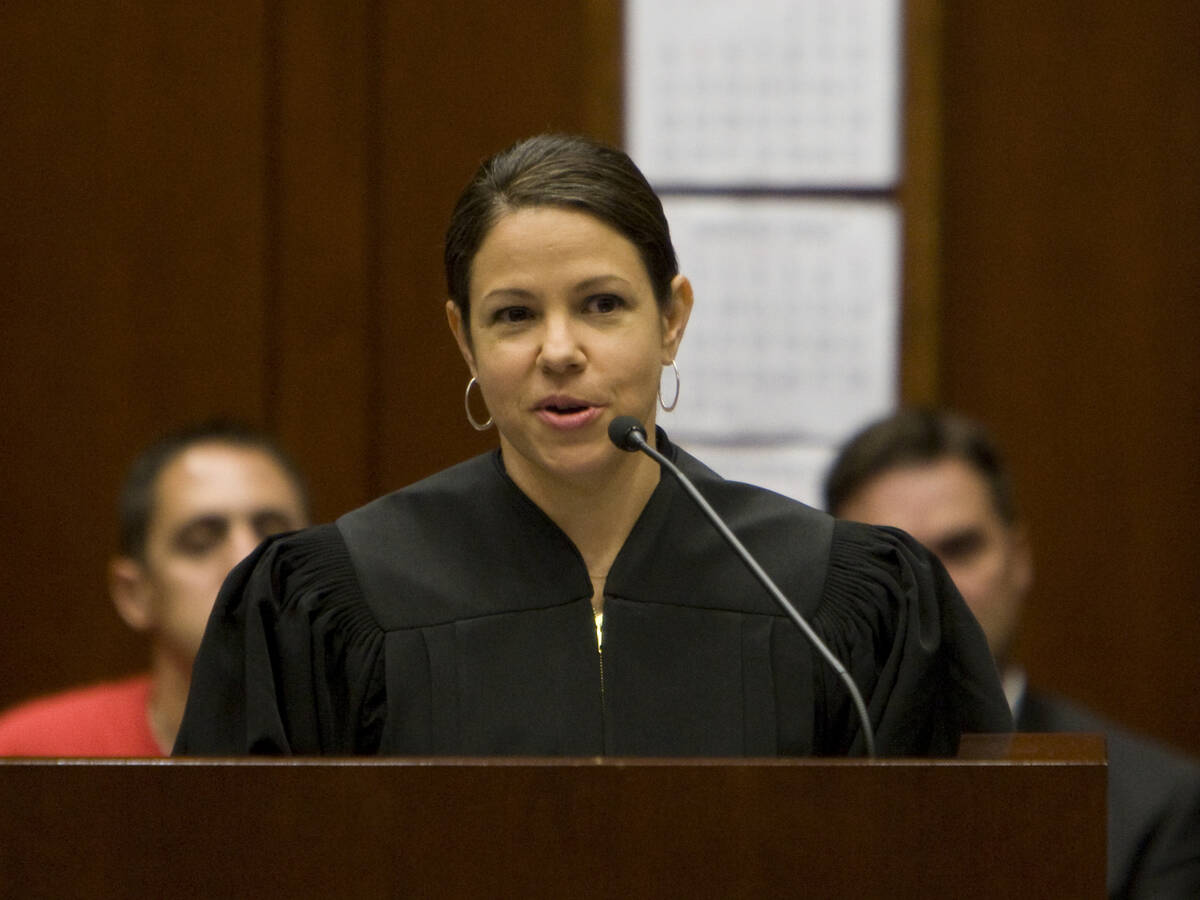Judge orders US to keep Venezuelan man in Nevada temporarily
A federal judge in Las Vegas ordered the government not to remove a Venezuelan man suspected of being a gang member, who attorneys fear is at risk of being deported to El Salvador under the Alien Enemies Act.
Attorneys for Adrian Arturo Viloria Aviles filed a petition April 3, denying the gang affiliation allegation and asking a judge to grant a temporary restraining order to keep Viloria Aviles in Nevada, prevent the federal government from applying the Alien Enemies Act process to his case and declare the process unlawful.
Viloria Aviles, 29, was detained at the Nevada Southern Detention Center in Pahrump, according to the filing. One of his attorneys, Michael Kagan, said he has since been moved to a detention facility in Texas.
U.S. District Judge Gloria Navarro granted a preliminary injunction Wednesday, ruling the government cannot remove Viloria Aviles from the country until a hearing is held in June.
The legal action comes after President Donald Trump invoked the rarely used 1798 Alien Enemies Act, due to what he described as an invasion by the Tren de Aragua Venezuelan gang. In exchange for payment from the U.S., El Salvador is holding suspected gang members in prison.
Attorneys insist he’s not a gang member
On Monday, attorneys for Viloria Aviles filed an emergency application for a temporary restraining order that would keep immigration authorities from moving Viloria Aviles outside the court’s jurisdiction. The attorneys added Viloria Aviles has already been transferred to the facility in Texas, and warn that removal from the country would jeopardize the ability for Viloria Aviles to receive a fair trial, according to Monday’s 29-page filing.
“If (Viloria Aviles) is removed to the custody of another country, the government’s position is that this Court will lose jurisdiction permanently,” which would cause “irreparable harm,” the filing states.
Viloria Aviles has been designated as a member of the gang by the Department of Homeland Security, according to court records.
But attorneys for Viloria Aviles insist he is not involved with Tren de Aragua.
“Federal law gives people from other countries the right to apply for asylum, and our client is entitled to the same due process as anyone else in this regard,” American Civil Liberties Union of Nevada executive director Athar Haseebullah said in a statement. “He should rightly be able to follow the normal asylum procedures, and the government should not be empowered to disappear people with no explanations and no oversight.”
To date, the ACLU has filed more than 80 lawsuits and legal actions against the Trump administration across the country, Haseebullah said.
Viloria Aviles is being represented by lawyers from the ACLU and UNLV’s Thomas & Mack legal clinic. They fear that if he is deported to El Salvador, he could face torture and indefinite detention, according to the filing.
“I challenge those who would blindly bow to the federal government to put partisan talking points aside and consider the precedent these actions are setting for the future,” Haseebullah said.
Kagan, who leads UNLV’s immigration clinic, said he believes his client’s petition is the only Alien Enemies Act case pending in Nevada federal court.
He said the federal government seems to be making gang allegations casually.
“They are clearly targeting a lot of Venezuelan young men,” he said.
A spokesperson for the Nevada U.S. attorney’s office declined to comment.
Concerns about due process
The petition said Viloria Aviles had an immigration court case in Las Vegas, but notified attorneys through a family member that he was going to be moved to another state.
“By transferring Petitioner-Plaintiff out of Nevada so close to his two hearings, ICE is likely to prevent, obstruct, or delay Petitioner-Plantiff’s access to due process,” the document alleged.
Viloria Aviles, a Venezuelan citizen, entered the U.S. in August 2023 and was living in Utah when Immigration and Customs Enforcement detained him, according to the petition.
A Department of Homeland Security form attached to the petition stated Viloria Aviles was arrested by Border Patrol in 2023, but released when there wasn’t enough space to detain him. He was “found to have a credible fear claim” and said he had “fear of persecution or torture if removed to Venezuela,” according to the record.
Kagan said Viloria Aviles “is afraid for his life and safety in Venezuela.” Although the U.S. government has not yet threatened to use the Alien Enemies Act in Viloria Aviles’ case, the goal of the case is to preserve his client’s right to the asylum process as Viloria Aviles heads towards a June asylum trial in immigration court, he said.
Viloria Aviles was previously beaten by Venezuelan intelligence forces and is afraid of being beaten again by the government if he doesn’t pay extortion money, said Kagan.
Viloria Aviles has a history of traffic issues and misdemeanor conviction for firing a BB gun, according to his attorney. Federal records describe the case as discharging a firearm in city limits and say “his plea was held in abeyance.”
Contact Noble Brigham at nbrigham@reviewjournal.com. Follow @BrighamNoble on X.
The Associated Press contributed to this report.



















